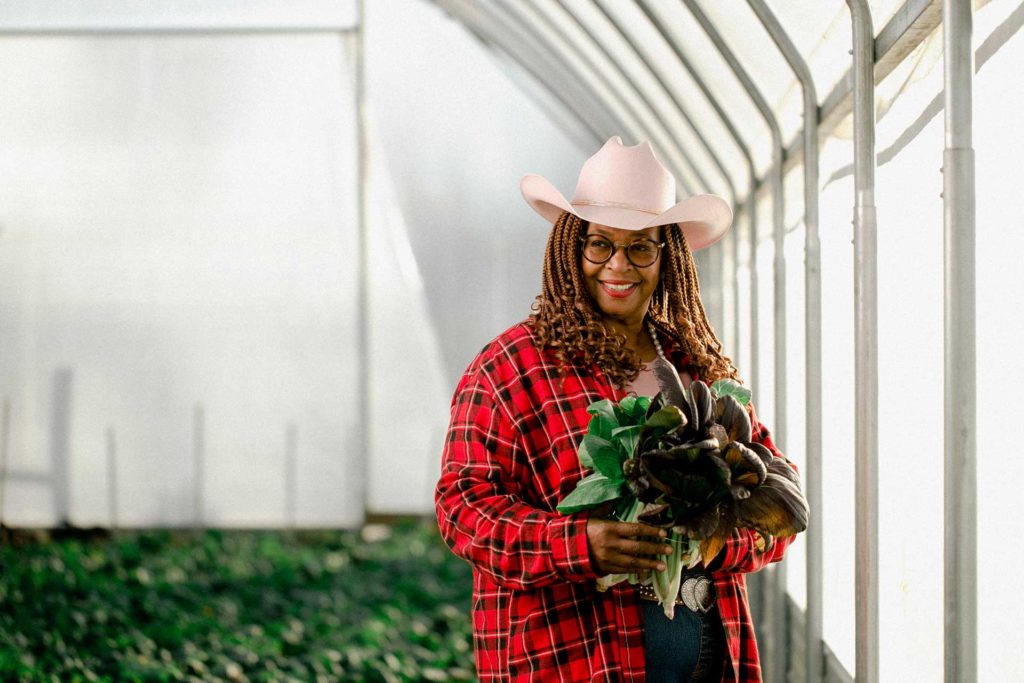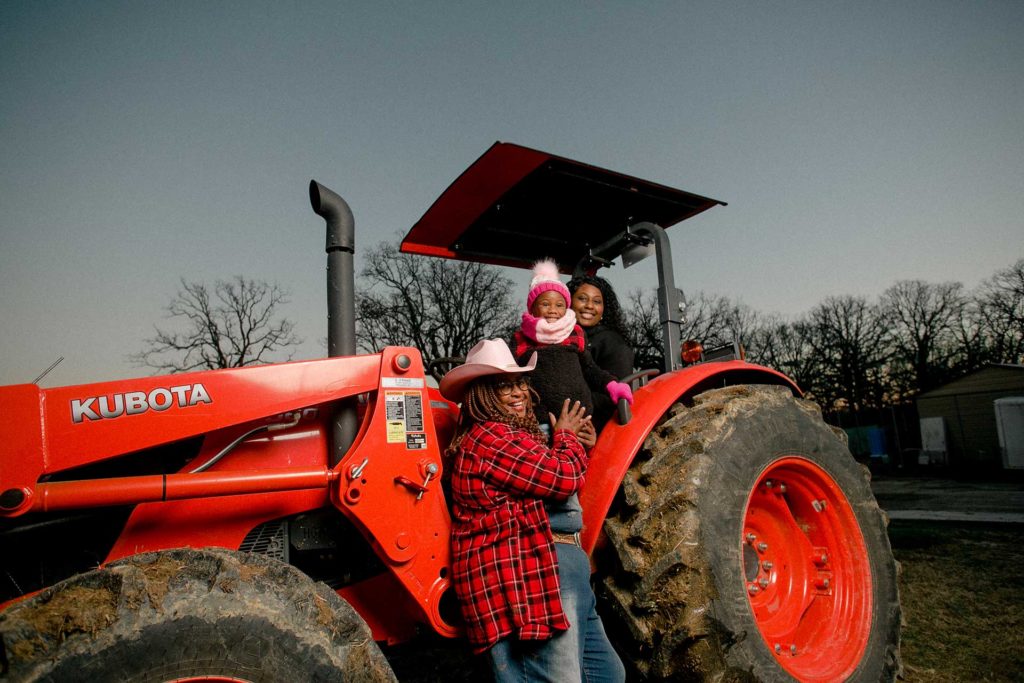
“Inspiring more” is Dr. Cindy Ayers Elliot’s job description. As CEO of Foot Print Farms, she is a farmer, teacher, mentor, policy advisor and community leader. Her 68-acre West Jackson farm is a literal oasis in the middle of a food desert. In addition to harvesting fresh produce to share with neighborhood school kids and community groups, Cindy and her Foot Print farmers are inspiring their neighbors to think about food differently. Teaching children to love eggplant is no small feat. But that’s what Cindy loves most about her job – planting seeds in minds.
To that end, Cindy is also a committee member for the National Socially Disadvantaged Farmers and Ranchers Policy Institute, housed at Alcorn State University. The mission is to update USDA Farm Bill regulations that have resulted in unfair practices for small and socially disadvantaged farmers. She has also partnered with Thabi Mayo and Chef Enrika Williams to celebrate and promote Mississippi’s creative entrepreneurs with Magnolia Sunset Markets.
It’s always a good day when I get to speak with Cindy. Her joy and drive are contagious. So I was thrilled to share a morning with her on the farm. Unsurprisingly, I learned a few things.
You can visit Cindy every Saturday morning at the Mississippi Farmer’s Market. Just look for the pink cowboy hat. Farm boxes are also available to order at footprintfarmsms.com.
You do a lot more than farming at the farm, don’t you?
I began my career as an investment banker. Now I’m investing in people – and encouraging people to invest in community. It’s all about how we impact each other to make a difference. It’s all about creating touch points to build community. So I work with the local churches and schools and partner with organizations like Operation Shoestring and Revitalize Mississippi.
This not only helps the communities but also my farmers by creating more outlets for their produce. I’m also making connections with landless farmers and giving them access to farmland and markets for their produce. In addition to farmer partners, Foot Print also hosts interns to introduce them to the farming business.
We also want to increase access to nutrition with healthy, affordable local foods. We take pride in growing healthy food for our communities. We also show them how to grow their own food. Every touch point is an opportunity.
You’ve been teaching kids to grow their own vegetables. How do they like that?
They want to eat them! Even eggplant. When they grow it, they want to taste it. They want to see because they care. They were the reason this eggplant exists. And we teach them the financial side. This little cucumber seed might cost you a whole penny. Then we’ll count out twenty seeds and explain every cucumber you grow could get you a whole dollar. So you just made how much money?
They want to take each of these little seeds and put them where they are supposed to be. See, this is my money! So, we get them thinking like that. And after they grow it, we say, “Here’s your money.” And they’re just like, “Wow, I want to grow something else!” We changed that whole perspective about what food is and what you can do. One little seed makes a difference. Just one.

What’s been growing in the community?
You know, one of the churches that we work with, Rosemont Missionary Baptist Church, they have a great community spirit. They do a lot in the community. We’ve been able to work with them and pull in other groups and people from the community. Now they’re working together and major things are happening.
Like the Bottom Gardens Park – it’s a collaboration with the church, the community, Lake Elementary School and Revitalize Mississippi. Many of the students live in the neighborhood and walk to school every day. They were walking by abandoned houses, which had become rodent-infested houses and drug houses.
Now, we’ve been able to clear some of these lots. We’re building community gardens. The location of the park had houses that should have been down 20 years ago. When we took those houses down, we let the students come outside and see it. You should have heard the cheers! So now this is a beautiful park where they can come any time and the teachers can take their students out there for a class.
It’s all because they were a part of putting it there. They were a part of helping us clean it up. Everybody’s invested.
You always have a plan. What’s next?
My son, LaGrand is now home to help handle farm logistics, so I can spend more time in the community. I’ve started a new 501c3: TIME (To Improve Mississippi Economics). Foot Print Farms does a lot of work with the community, but it is a profit center. Our goal is to help these farmers make money. TIME opens up grant money to give even more back to community programs. We’ve already partnered with the Kellogg Foundation, NRCS and Novo Nordisk. We’re ready to make things happen!
Tell me more about the Magnolia Sunset Markets.
I’m working with two super-dynamic women who are bringing a new type of energy that I’m so happy to be a part of. The Market highlights small businesses, which is what I’m all about. We’ve opened an Urban Agri-Cultures Center, a five-acre area at the farm, which is dedicated to economic development projects like the Magnolia Sunset Markets.
The Markets happen the third Saturday of the month. These are all local vendors. A lot of these businesses popped up during COVID because they had no jobs to go to. So now we have these new entrepreneurs who found another way to make some income. But I think also what the pandemic did is slowed you down enough to be able to realize that you can do things differently.
Speaking of that, leaving the Manhattan financial world for Mississippi farm life is a pretty big corner to turn. What inspired that choice?
I’m a native Mississippian, so inspiration to make that change, to make that leap, it took a mountain of belief. But it was the best jump I’ve ever made in my life. September, 11 made you really look around and look at yourself to see what was important and what you thought was important.
I had been working in a lot of third world countries. I got to see things differently – how great we have it here in America, but also how much more we can do to improve our disadvantaged communities. The hope is when you go into that, you’re going to do something to make an impact and make a difference.
I saw the grace to come back home to Mississippi. Now I’m able to truly help. Working with these groups, you can see the things that you’re doing are actually helping the people that really need it. And that makes a big difference. For me, it’s like: Oh, wow! We’re farming! Hard work. Yes. New work. Yes. But at the same time, it’s a new way to do it.
How did you get involved with the Policy Research Center at Alcorn State?
Before I went into farming, I researched for over a year – finding the programs that I wanted to be involved with. I knew their policies as well as they knew their policies. I was in the Hinds County office so much, they thought I worked there. I did the work to do the work.
The fine print is a killer. It really is. Here’s a good example. I heard from many farmers that had requested assistance to build ponds. But the response was “we don’t do ponds.” Well, this is true. They do “water systems.” But they don’t tell you that. They just say we don’t do ponds. It’s out there. But you have to know what to ask.
That’s the great thing about being a part of the Policy Research Center. We can pull all this data, and really utilize it within this industry. The 2014 Farm Bill created the Socially Disadvantaged Farmers and Ranchers Policy Research Center at Alcorn. Eloris Speight is the Executive Director. She’s retired from the USDA, and was recruited by Congress to come in and get the Policy Research Center up to speed. And in the last Farm Bill, some of the items that we pushed for actually got written into the bill.
I’m very proud to say, we had a conversation with the new FSA Administrator. He is a native American. So that’s a whole new way of looking at it from the top and understanding what discrimination is and how it’s been happening. It is a new day and we have hope.

